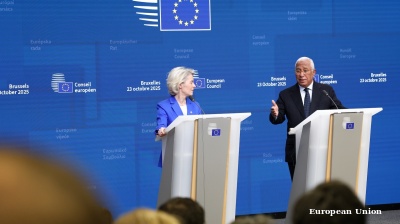Major supermarket chains have already established a strong presence in the larger markets of Southeast Europe and are now gradually expanding into smaller economies across the region. However, a different kind of retailer is also thriving: smaller convenience store chains that cater to individual neighbourhoods are capitalising on the growing consumer desire for frequent, local shopping experiences.
As the region becomes more prosperous, with rising incomes — though it still includes some of the poorest countries in Europe — these chains are steadily expanding. This mirrors a global trend that retail analysts have identified, pointing to the rapidly growing niche of convenience stores.
“Simple corner grocery stores, built to meet the needs of a local community, have evolved into international mega-chains of 3,000 plus stores, carrying 50 to 100,000 products from every corner of the earth,” says a 2023 report by Deloitte. The report attributes this shift to changing demographic patterns: “The nuclear family of mom, dad, and 2-3 children living in a suburb, commuting to work, and grocery shopping on the weekend no longer represents most US or, indeed, Western households. We are increasingly diverse."
Competition in the convenience sector is intensifying. Supermarkets are ramping up investments in smaller, more convenient store formats to strengthen their foothold in local communities, increasing pressure on independent retailers.
Throughout the COVID-19 pandemic, convenience stores proved essential as local shopping hubs, offering proximity and even home delivery options during lockdowns. By 2021, as the pandemic began to recede, consultancy McKinsey said in a report on Europe’s grocery retail sector: “Convenience stores have … made a comeback in recent years, offering a highly targeted assortment in a small format of less than 400 square meters. Factors include increased demand for freshness, on-the-go options, and local convenience in high-density neighbourhoods and areas with high foot traffic, along with changing demographics such as declining average household size and an aging population.”
The trend is not entirely pandemic-driven. Even before the crisis, markets like Romania and Serbia had seen success in the convenience store space.
Ahold Delhaize’s Mega Image chain in Romania, for example, has been in operation since 1995, with stores ranging from small neighbourhood grocers to supermarkets. As of 2024, it boasts more than 800 locations across Bucharest and other regions. Profi, another local player, which was acquired by Delhaize in €1.3bn deal, operates a similar mix of smaller stores and larger supermarkets.
The pandemic did accelerate this trend, however. In 2021, Romania’s convenience store sector experienced significant sales growth as proximity retailing became more important due to the pandemic. Many consumers, wary of the virus, avoided crowded supermarkets and hypermarkets in favour of nearby stores. These smaller outlets also became essential during lockdowns, meeting everyday needs.
The momentum carried into subsequent years. Carrefour Romania, for instance, strengthened its presence in the convenience sector by launching 22 new Express stores across nine cities in 2023. With this expansion, Carrefour now operates a total of 162 Express locations, offering more than 4,500 products, including fresh goods from local farmers.
A newer entrant to the Romanian market is Poland’s Zabka. In January, Zabka announced plans to introduce a new chain in Romania, opening its first five outlets in Bucharest under the Froo name within a month.
"Romanian consumers appreciate small, nearby shops where they can make impulse purchases for immediate consumption, which is why Froo fits in well with their needs,” said Anna Grabowska, CEO of Zabka International, at the time. She added that with over 19mn inhabitants, Romania represents the second-largest consumer market in the region after Poland.
The popularity of neighbourhood and convenience stores in Serbia also surged in the late 2010s. This was driven by investments from major retailers like Delhaize Serbia and Mercator-S, as well as from smaller emerging chains such as Gomex, Persu and Aroma Market.
Today, Moj Kiosk — a chain consisting of kiosks and convenience shops — claims to be Serbia's largest retail chain, serving over 380,000 customers daily.
In Croatia, Studenac distinguishes itself from other grocery chains through its proximity format, which focuses on small basket shopping for daily essentials. Around 60% of Studenac’s stores are between 60 and 180 square metres in size, with the average store being approximately 120 square metres. Since being acquired by private equity firm Enterprise Investors in 2018, Studenac has grown from a local player in Dalmatia to a nationwide chain, becoming Croatia’s largest retailer by store count.
“We have developed and implemented a unique proximity retail model that makes us very different from other players in Croatia, and actually the only pure-play proximity format. We predominantly service a small basket of everyday shopping,” said Michał Seńczuk, CEO of Studenac, in an interview with bne IntelliNews in 2023.
He added: “The keys to success include location, opportunities for customers to save time, a product offering tailored to the local consumer, and a good, neighborly atmosphere. We are convinced that small-format stores are the future of retail in Croatia.”
Enterprise Investors acquired 100% of Studenac through its Polish Enterprise Fund VIII in a deal announced in June 2018. The investment was driven by expectations of favourable macroeconomic conditions, strong tourism, and consumer preferences for shopping close to home or work.
Kosovo’s Meridian Express grocery chain has expanded to 45 stores across eight major cities in the country. According to the company’s website, "Meridian Express was founded in October 2012 as a network of neighborhood stores where we are present in the eight main cities of Kosovo. With the motto ‘at the door of the house,’ our goal is to serve our customers in every neighbourhood, saving time while offering the freshest products and a friendly shopping environment.”
Meridian Express has continued its expansion across Kosovo, even moving into the Serb-dominated North Mitrovica in August, despite ongoing ethnic tensions in the area. The store’s opening took place under a heavy police presence.
A newcomer in Bulgaria, Minimart was launched in March 2023. The chain operates small convenience stores, typically between 50 and 120 square meters, strategically located near public transport hubs, high-footfall pedestrian areas, schools, universities, workplaces and residential neighbourhoods.
Minimart received a boost from Trinity Capital, a local firm with interests in pharmaceuticals, agriculture and real estate, when it invested €5mn for a 14.3% stake in BGC, the parent company of Minimart. This investment supplements the founders' initial €30mn investment and is aimed at accelerating the company’s expansion across Bulgaria.
In North Macedonia, local chain Kam Market, known for offering affordable, high-quality products in low-key stores, has become the most popular chain, overtaking larger, higher-end supermarket chains Vero, Tinex and Ramstore. Kam Market continues to dominate as the business leader with the highest revenues of €268.8mn in 2023, a position it has held for several years.
An increasing number of Macedonian consumers are also gravitating towards other chains of smaller stores like Stokomak and Kiper. Following closely behind Kam Market is Kiper, which generated €175.2mn in revenue. In third place is Stokomak, with a turnover of €138.5mn an annual rise of 16%, news portal Pari reported on August 29. As in other countries in the region, consumer spending in North Macedonia is projected to see a significant increase, with an expected growth of €260mn this year. By 2025, total spending is anticipated to reach €2.5bn from €1.9bn by the end of 2023.
With contributions from Valentina Dimitrievska in Skopje.
Features

Draghi urges ‘pragmatic federalism’ as EU faces defeat in Ukraine and economic crises
The European Union must embrace “pragmatic federalism” to respond to mounting global and internal challenges, said former Italian prime minister Mario Draghi of Europe’s failure to face an accelerating slide into irrelevance.

US denies negotiating with China over Taiwan, as Beijing presses for reunification
Marco Rubio, the US Secretary of State, told reporters that the administration of Donald Trump is not contemplating any agreement that would compromise Taiwan’s status.

Asian economies weigh their options amid fears of over-reliance on Chinese rare-earths
Just how control over these critical minerals plays out will be a long fought battle lasting decades, and one that will increasingly define Asia’s industrial future.

BEYOND THE BOSPORUS: Espionage claims thrown at Imamoglu mean relief at dismissal of CHP court case is short-lived
Wife of Erdogan opponent mocks regime, saying it is also alleged that her husband “set Rome on fire”. Demands investigation.




